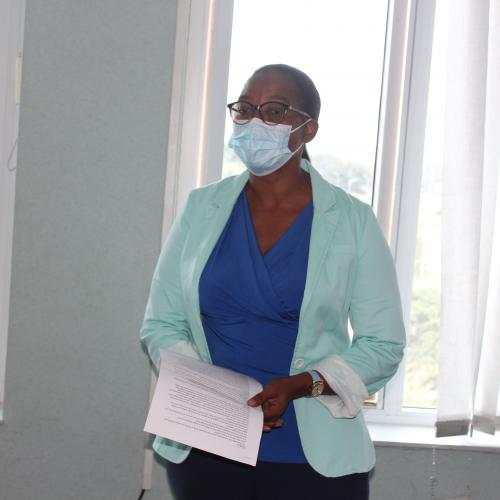By Tapela Morapedi, 31 March 2022
Botswana Harvard AIDS Institute Partnership (BHP) on March16,2022 updated the Ministry of Health and Wellness (MOHW) on the progress of Tsepamo Study. Tsepamo study is an observational surveillance Study of birth outcomes in 16 public hospitals throughout Botswana. The primary objectives of the study include; comparing birth outcomes (stillbirth, preterm delivery, small for gestational age, congenital abnormalities and in-hospital neonatal deaths) among HIV-infected women and HIV-uninfected women, and initially, to determine whether there is increased neural tube defects among children born to women on TDF/ FTC/EFV (Atripla).
The update covered the current status of the study and the next steps for expansion. Updating on the study accomplishment since it started in August 2014, Study Coordinator Modiegi Diseko reported that, of 222,018 deliveries, 6017 abnormalities have been reported. Of these 1346 were major congenital abnormalities/ neural tube defects. 1265 women consented for direct assessment of congenital abnormalities by specialists.
She further updated that following an initial signal for potential association of Neural Tube Defects (NTDs) associated with dolutegravir (DTG) exposure from conception, the most recent prevalence of 9 NTDs among 5,860 exposures is much lower than the original findings in 2018. She noted that it remains unknown why initial NTD prevalence was much higher in 2017- 2018. There are plans however for complete analysis of all major congenital abnormalities in late 2022.
On Birth Outcomes, the study has observed a strong association between “legacy” antiretroviral therapy (ART) and stillbirths as well as other adverse outcomes. The study has also observed high risk for adverse birth outcomes for adolescents, especially with HIV, vertically infected women on legacy regimens, women with hypertension in pregnancy, women with high and low weight, women with syphilis and COVID-19 as well as Non-citizens prior to 2019, before ART guidelines changed to offer ART to non-citizens.
“We have also observed decreased adverse birth outcomes after initial COVID-19 lockdown period, and some seasonality observed, lowest in September. Also observed is high antibiotic use in pregnancy for which there is an ongoing analysis,” said Diseko.
Diseko highlighted that Tsepano study has been refunded through 2026 resulting in an extension of the study to analyze new ART regimens in a continuation Study to be called Tsepamo Plus.
“There is a plan for ongoing analysis of all new ART regimens added to the national programme to determine the safest regimens for use in pregnancy including TAF, and long-acting Cabotegravir through 2026. The study will also look at maternal outcomes, birth outcomes and congenital abnormalities. Finally, the study will also track HIV prevalence over time in pregnant women, and provide background data for other studies and programmes,” she said.





